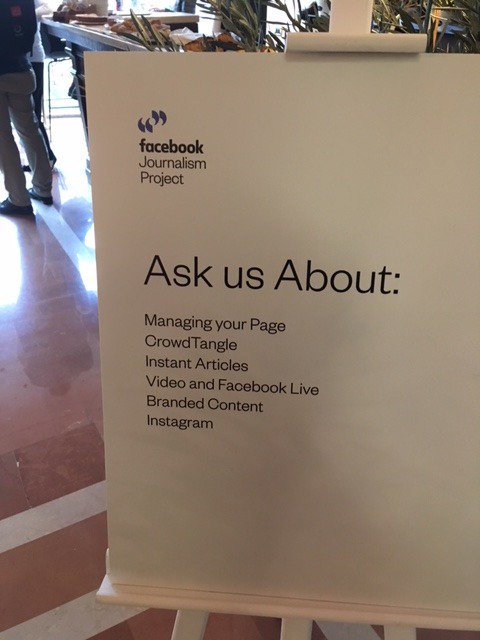Outside the Facebook booth.
I can think of other things I might ask them about.
12 April 2018 (from the IJF in Perugia, Italy) – Watching the two days of testimony in front of Congress by Mark Zuckerberg (ensconced with many of the reporters and media companies who have covered Facebook or partner with Facebook) you come away with a feeling that this is all far, far more than legislation. And that’s because to many attendees here the issue is far bigger than Facebook and how it treats its users’ data, or Cambridge Analytica and Facebook’s complicity in the shenanigans of the 2016 U.S. Presidential election, and other elections. Or even fake news.
Yes, much of what Zuckerberg said was missed entirely by the totally incompetent Congressional inquisitors who demonstrated that they knew zip about how Facebook is run, or how social media works in general. Left unchallenged? Zuckerberg wants you to simultaneously believe that average users can always know how their data will be used … while claiming Facebook’s engineers had no idea that data could be misused in the way that it was.
But that’s not the biggie. “The Big Enchilada” is that we no longer feel in control of the technology in our lives. That feeling of losing control has been building steadily for the last several years, as our lives have become both more dominated by technology and more dependent on technology. It’s the feeling that the pace of our lives, and the next thing on our “to-do” list, is no longer up to us. It comes via the endless screens and algorithms we’re immersed in. Arianna Huffington put it this way:
We know that the feeling of autonomy is one of the single most important factors in our happiness. But we’re feeling less and less autonomous.
And right as this feeling is hitting the tipping point, along comes the Facebook story. It’s not only a compelling narrative about how our lives were taken over by technology, it’s one that already has several legislative fixes in the works. Which isn’t to say the anger at how data was misused during the election isn’t justified. It surely is. Or that it’s not worth debating the Honest Ads Act, introduced late last year, or the CONSENT Act, introduced just this week.
And that’s because as noted by many here these hearings cannot be a stand-in for the larger discussion we need to have but a springboard. That’s because the tectonic shifts in our relationship with technology go way beyond Facebook, and won’t be stopping even if the perfect regulatory fixes are passed. Well, a regulatory fix? The chances of that are zero.
Across the 392 sessions and workshops and 793 speakers in this 5-day event a quick glance shows 38 sessions/panels addressing Facebook issues, with others mentioning Facebook as a “line item” in their presentations. This year we’ll have a rather extensive wrap-up of the event (with video interviews) because we seem to have hit subjects that impact every member of my diverse (and rather eclectic) readership: artificial intelligence, cybersecurity, e-discovery, media-in-general, politics, and science. Much of it will also inform the conclusion to my series on Facebook.
But just a few thoughts from some early sessions …
“Facebook to journalists”
For most of the pack here what Facebook (et al) should do/does for (and to) the news is paramount. And some heavyweights in the media ecosystem have weighed in, among them: Jay Rosen, who teaches journalism and directs the Studio 20 program at NYU, a major critic of the press; Tanit Koch, journalist, former @BILD editor-in-chief; Jeff Jarvis, @BuzzMachine blogger and journalism school professor and author of What Would Google Do? which I have recommended; Jennifer Lee, head of @plympton, a literary studio, film producer, seed investor; Rasmus Kleis Nielsen, a media/news/journalism researcher, Director of Research at Reuters Institute.
A few points:
- The hope is that efforts to combat the abuse of platforms like Facebook won’t involve systematically reducing and restricting the role of news. News benefits from access to relatively open and permissive platforms, even if they are often also uncomfortable and difficult.
- There is a fear that 2018 will be the year we will see a major platform decide that news is simply not worth the trouble and move to (1) reduce the role of news and systematically separate it from other content and (2)reduce the number of news organizations allowed to publish to the platform, strictly controlling who has the opportunity.
- For example: talk of echo chambers and filter bubbles aside, research suggests social media use drives incidental exposure, increasing the number of sources of news most people use and (however marginally) countering growing information inequality.
- But clearly, publishers are concerned over their editorial control in increasingly distributed environments, access to data, and opportunities to monetize content. The overall feeling is that it will benefit platforms long-term to be good partners with publishers.
As always at the events, riveting conversations.

